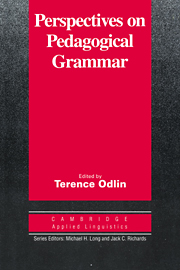Book contents
- Frontmatter
- Contents
- List of contributors
- Series editors' preface
- Preface
- Chapter 1 Introduction
- I WHAT SORT OF GRAMMAR?
- II GRAMMAR, LEXICON, AND DISCOURSE
- Chapter 5 Words and their properties: Arguments for a lexical approach to pedagogical grammar
- Chapter 6 Grammatical consciousness-raising and learnability
- Chapter 7 Functional grammars, pedagogical grammars, and communicative language teaching
- Chapter 8 Learning to function with the other tongue: A systemic functional perspective on second language teaching
- III PUTTING GRAMMAR TO WORK
- Glossary
- Index
Chapter 8 - Learning to function with the other tongue: A systemic functional perspective on second language teaching
Published online by Cambridge University Press: 05 October 2012
- Frontmatter
- Contents
- List of contributors
- Series editors' preface
- Preface
- Chapter 1 Introduction
- I WHAT SORT OF GRAMMAR?
- II GRAMMAR, LEXICON, AND DISCOURSE
- Chapter 5 Words and their properties: Arguments for a lexical approach to pedagogical grammar
- Chapter 6 Grammatical consciousness-raising and learnability
- Chapter 7 Functional grammars, pedagogical grammars, and communicative language teaching
- Chapter 8 Learning to function with the other tongue: A systemic functional perspective on second language teaching
- III PUTTING GRAMMAR TO WORK
- Glossary
- Index
Summary
Introduction
As a domain of academic enterprise, applied linguistics has had more than its fair share of “approaches”. Each new approach is presented as “the” solution to some major problem encountered in its practice; each approach promises to shore up its theoretical foundations. But the remark that Harold E. Palmer, one of the earliest pioneers in the field, made nearly a century ago still appears apposite: “Evidence of various kinds shows that this subject has not attained the scientific stage, but is so far in the experimental or empirical stage” (Palmer 1917: 1). To remedy the situation, he recommended greater focus on language, believing that inquiry into its nature “must necessarily be of interest to method-writers, to teachers, and to students” (Palmer 1917: 3); and a countless number of applied linguists have rightly embraced this view – we say “rightly” because it seems reasonable to hope that an understanding of what language is like would help in deciding what to do about teaching it efficiently. We grant also that when Palmer was expressing these views, our understanding of the true nature of language was not very deep. But if the strident claims made by today's dominant paradigms of linguistics are to be believed, by now the many marvellous “revolutions” in linguistics ought to have remedied this situation: We ought to have “the” true insights into the nature of language. Clearly this has not happened, for applied linguistics still continues in ferment.
Information
- Type
- Chapter
- Information
- Perspectives on Pedagogical Grammar , pp. 179 - 226Publisher: Cambridge University PressPrint publication year: 1994
Accessibility standard: Unknown
Why this information is here
This section outlines the accessibility features of this content - including support for screen readers, full keyboard navigation and high-contrast display options. This may not be relevant for you.Accessibility Information
- 11
- Cited by
